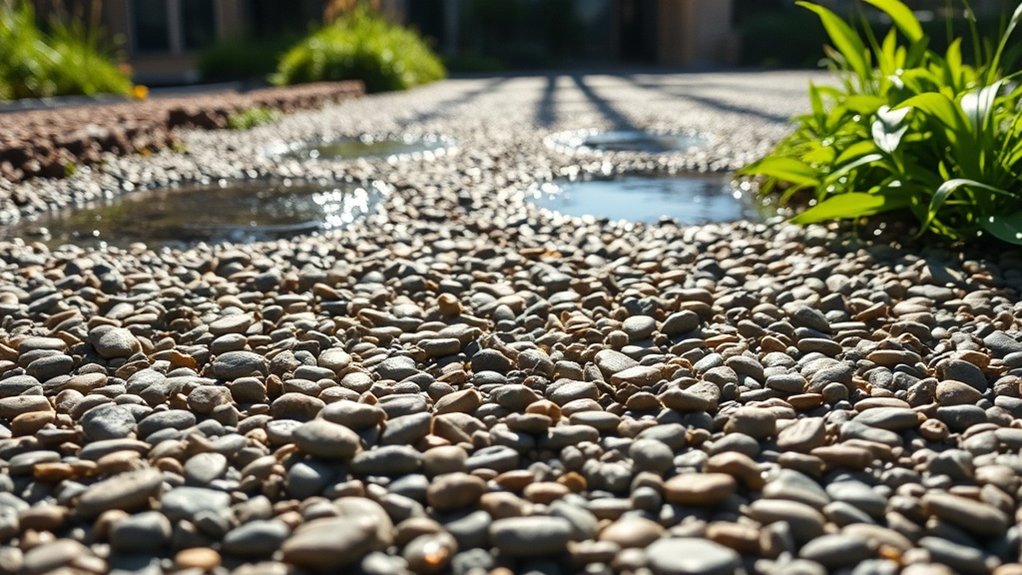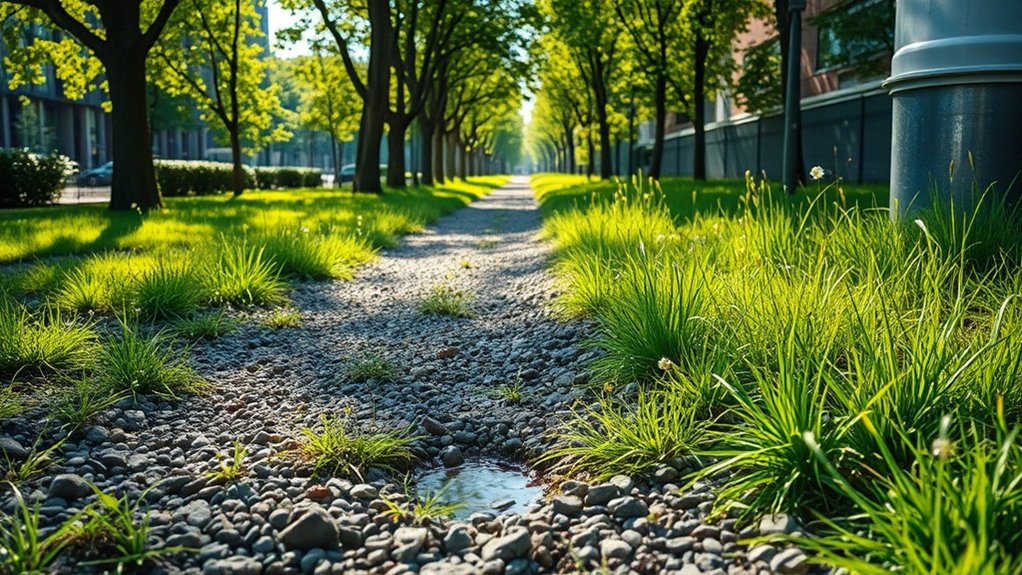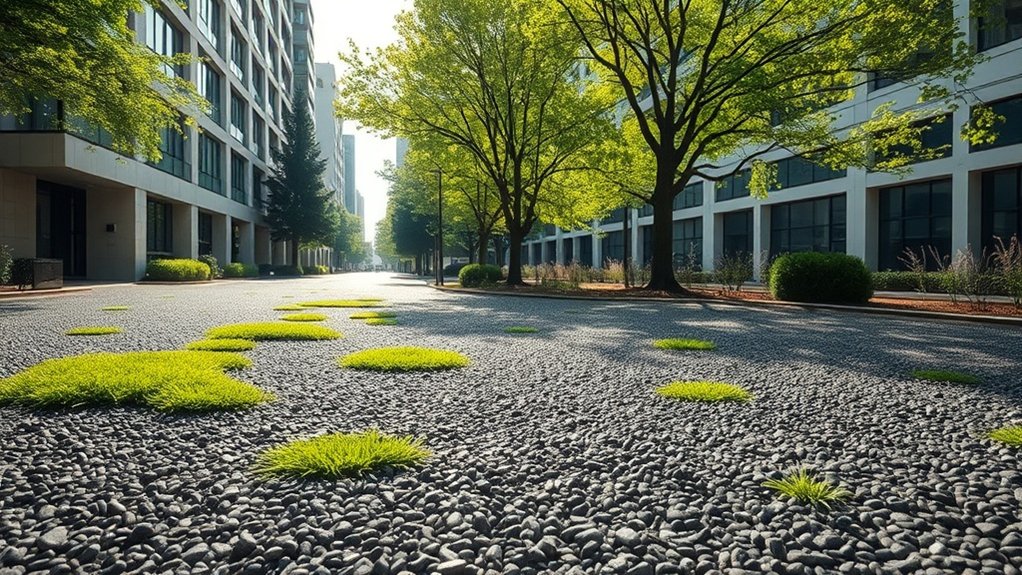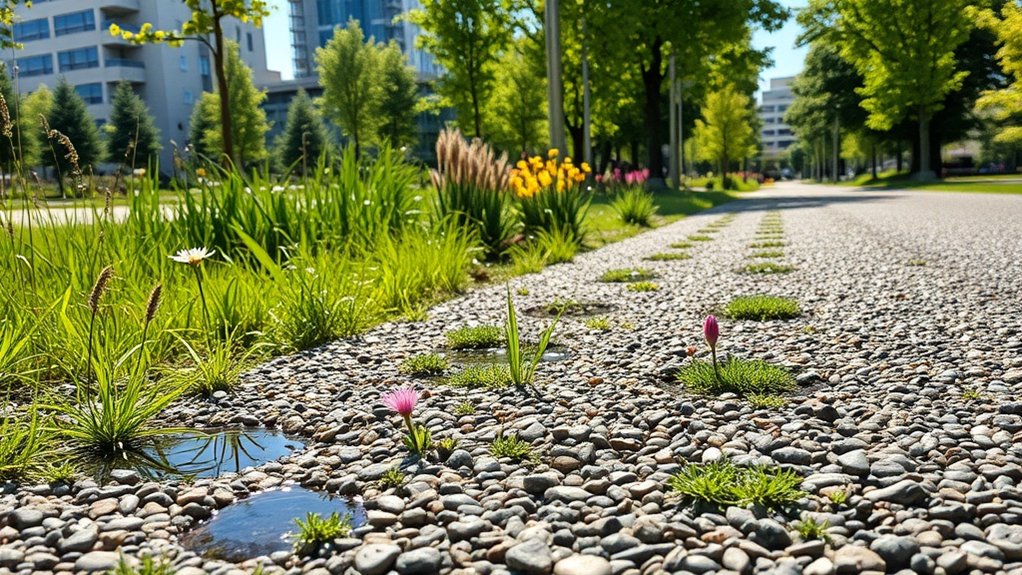Permeability makes resin-bound gravel a genuinely eco-friendly surface choice for British homes and developments. The surface lets rainwater soak through naturally, much like a garden lawn, rather than forcing water into drains. This natural drainage helps top up local groundwater levels and keeps nearby plants healthy by maintaining proper soil moisture.
Think of it as a sustainable alternative to concrete or tarmac – when it rains on those surfaces, water simply runs off into already-strained drainage systems. In contrast, resin-bound gravel works with nature, reducing flood risks during heavy downpours and helping cool urban areas during heatwaves.
The system’s durability means it won’t need frequent replacement, cutting down on materials and labour over time. For homeowners and developers keen on sustainable options, resin-bound gravel offers practical environmental benefits whilst maintaining an attractive finish.
Key Takeaways
Resin-bound gravel’s excellent permeability makes it a brilliant eco-friendly choice for UK properties. The surface naturally soaks up our notorious British rainfall, much like a sponge, preventing those annoying puddles we’re all too familiar with on pavements and driveways.
The materials used are environmentally sound and work perfectly with our local climate, helping manage the drainage issues that plague many UK towns and cities. Think of it as a natural water filter – when it rains, water seeps straight through rather than flooding your garden or driveway.
Beyond water management, these surfaces are remarkably tough. They’ll handle years of British weather without needing much upkeep, which means less waste and fewer repair costs. You won’t need to replace it nearly as often as traditional paving.
The environmental benefits extend further – these permeable surfaces help cool urban areas during summer heatwaves and improve local air quality. It’s particularly useful in busy city centres where green space is limited but environmental impact matters most.
Understanding Permeability and Its Importance

Understanding permeability matters when working with materials like resin-bound gravel, as it affects how liquids move through surfaces. Think of it as measuring how easily water can pass through tiny gaps in a material – much like how quickly water flows through a coffee filter versus a plastic bag.
Whilst many materials have gaps (porosity), they’re only properly permeable if these gaps connect to form pathways. For instance, a sponge is both porous and permeable, whilst some plastics might’ve air bubbles but no connected passages. In resin-bound gravel systems, proper permeability is crucial for managing rainwater and moisture. Without it, water can become trapped, leading to problems like frost damage in winter or algae growth. Good permeability allows water vapour to escape naturally, preventing damp issues and helping maintain the surface’s integrity. Understanding vapor permeability is essential to ensure that moisture can escape effectively and avoid potential structural damage. Additionally, ensuring a balanced mix ratio of resin to aggregate contributes significantly to maintaining permeability.
Builders and architects measure permeability in perm ratings or Darcy units to ensure surfaces meet UK building regulations and perform well in our wet climate.
Getting the right balance means creating surfaces that drain effectively whilst remaining stable and durable throughout the seasons.
Environmental Benefits of Resin-Bound Gravel

Resin-bound gravel offers significant environmental advantages that make it an excellent choice for sustainable landscaping across the UK. The surface’s natural permeability helps manage Britain’s frequent rainfall by reducing surface water runoff and flood risks in urban areas.
Think of it as a giant sponge that allows rainwater to seep through naturally, much like our countryside’s natural ground cover. The material proves remarkably durable, lasting far longer than traditional tarmac or concrete, which means less frequent replacements and reduced waste. Additionally, its use of recycled materials not only supports local economies but also minimizes landfill strain. Furthermore, this eco-friendly option incorporates sustainable drainage solutions, promoting healthier groundwater practices.
Using local stone aggregates and recycled materials cuts down on transport emissions and supports regional suppliers.
What’s more, its natural resistance to weeds means you won’t need harsh chemicals to keep it looking tidy.
These practical benefits contribute to healthier local environments whilst meeting UK planning requirements for sustainable drainage solutions (SuDS).
For homeowners and developers alike, resin-bound gravel represents a practical way to create environmentally responsible driveways and paths that work well in our British climate.
Enhancing Soil and Vegetation Health

Permeable resin-bound gravel offers clear benefits for your garden’s soil and plant health. The system lets water flow naturally into the ground, encouraging strong root development whilst supporting local wildlife. It’s particularly effective at stopping soil washing away during heavy British rainfall – a common problem in many UK gardens. The result? Healthier plants, better drainage and a more stable growing environment for your garden’s ecosystem. Additionally, this high porosity of resin bound gravel allows effective water drainage, reducing puddling and flash flooding risks. By enabling groundwater recharge, permeable systems not only protect your garden but also contribute to local biodiversity and water quality.
Promoting Root Growth
Permeable surfaces do far more than just look good – they’re vital for healthy root growth and soil quality. Resin-bound gravel lets rainwater soak through naturally, much like a sponge, keeping roots well-watered.
This setup works brilliantly for British gardens, where regular rainfall needs somewhere to go rather than pool on the surface.
The gravel acts as a natural filter, similar to how a tea strainer works, improving water quality as it reaches the roots. Around trees and shrubs, these surfaces are particularly effective – imagine giving roots a clear path to grow rather than forcing them to fight through compacted soil.
Unlike solid paving, permeable surfaces help maintain the soil’s natural structure, letting roots breathe and expand. This is especially important in urban areas where space is tight and plants need all the help they can get.
The result? Stronger, healthier plants that cope better with our varied British weather.
Supporting Biodiversity Enhancement
Resin-bound gravel surfaces play a vital role in boosting local wildlife and plant diversity. These permeable surfaces help retain moisture in the soil, which is crucial for native plants to thrive.
The stable environment created encourages seeds to sprout and allows wildlife to move freely between different habitats.
When native plants flourish in these areas, they provide essential food and shelter for British wildlife, from bumblebees to garden birds.
The porous nature of resin-bound gravel also supports healthy soil bacteria and small organisms that keep the soil fertile.
Unlike traditional paving, these surfaces need minimal upkeep, which means less disruption to the wildlife that calls these areas home.
This practical approach to landscaping helps create robust, nature-friendly spaces that benefit the local ecosystem.
Preventing Soil Erosion
Resin-bound gravel surfaces offer effective protection against soil erosion whilst allowing rainwater to naturally seep through. The permeable surface lets water filter down gradually, cutting surface runoff that would otherwise wash away valuable topsoil. The gravel’s structure creates small spaces that slow water movement and catch harmful substances, leading to healthier soil.
| Benefit | Mechanism | Impact on Soil Health |
|---|---|---|
| Erosion Control | Cuts runoff by over 50% | Reduces soil loss |
| Soil Stability | Controls moisture levels | Promotes stronger roots |
| Vegetation Health | Stops water pooling | Boosts soil organisms |
For British gardens and landscapes, resin-bound gravel proves particularly useful in our rainy climate, helping maintain soil quality and supporting healthy plant growth.
Flood Risk Reduction Through Permeable Surfaces

Permeable surfaces, such as resin-bound gravel, soak up rainwater effectively, taking pressure off town and city drainage systems.
These surfaces prevent puddles from forming and lower flood risks in built-up areas.
Installing them in car parks, driveways and walkways helps manage heavy rainfall whilst protecting properties from water damage.
Think of them as giant sponges that give rainwater somewhere to go, rather than letting it pool on roads or overwhelm drains.
Efficient Rainwater Absorption
Reducing Flood Risk Through Rainwater Absorption
Permeable surfaces play a vital role in managing flood risks across UK towns and cities. Well-designed permeable pavements effectively capture rainwater whilst replenishing groundwater levels – much like a garden soaking up rainfall naturally.
Key considerations:
- Infiltration Rates: Porous materials absorb water remarkably fast – up to 3,810 centimetres per hour when newly installed.
- Design Factors: The depth of underlying stone and local soil conditions determine underground water storage capacity.
- Clogging Prevention: Smart design reduces sediment build-up, maintaining good drainage over time.
- Year-round Function: Permeable surfaces work effectively even during British winters, significantly cutting surface water runoff.
Think of it as giving our urban areas the same natural drainage abilities as countryside soil, helping prevent localised flooding during heavy rainfall.
Alleviating Urban Drainage Pressure
Urban growth is putting increasing strain on our drainage networks, raising flood risks across UK cities and towns.
Permeable pavements offer a practical solution, cutting surface water runoff and peak flows by up to 91% compared to standard surfaces. These materials work like natural ground cover, stopping the sudden water surges that often cause local flooding and soil erosion.
The clever design lets water seep through and stay in the pavement’s base layer, which means less rainwater overwhelms our drains.
Think of it as a sponge that slowly releases water rather than letting it rush straight into storm drains. This approach helps keep our drainage systems working properly for the long term and makes our cities better prepared for heavy rainfall.
For sustainable urban planning, permeable paving isn’t just an option – it’s becoming essential.
Reducing Standing Water Hazards
Reducing Standing Water Hazards
With UK rainfall intensifying and urban development expanding, tackling standing water has become crucial.
Permeable resin-bound gravel provides a practical solution to water management across British towns and cities.
The system works through:
- Infiltration: Waters drains straight through the surface, much like natural ground, cutting down surface puddles.
- Peak Flow Reduction: Slows storm water during heavy downpours, reducing runoff by up to 91%.
- Groundwater Recharge: Helps refill underground water supplies, lowering flood risks whilst supporting local ecosystems.
- Pollutant Filtration: Catches harmful substances from rainwater before they enter our waterways.
This solution proves particularly effective for British driveways, car parks and pedestrian areas where standing water typically causes problems during our wet weather.
Urban Resilience and Sustainable Water Management

Urban resilience and sustainable water management go hand in hand as UK cities tackle growing climate change pressures and urban growth.
Good water management needs a whole-system approach, from water sources right through to household taps. Working with local councils, water companies and residents helps spot key risks and weak points, leading to better solutions.
Take Manchester’s recent flood defence programme – it shows how local authorities and water companies can work together to protect water supplies and prevent flooding.
By treating water as a circular resource, cities can reuse more water and cut waste, making the whole system more sustainable. This practical approach not only makes cities more resilient but ensures everyone, including disadvantaged areas, has reliable access to clean water and proper sanitation.
The approach works particularly well in British cities where rainfall patterns are changing and infrastructure needs updating.
Combining traditional water management with new technologies helps create stronger, more adaptable urban water systems that work for everyone.
Aesthetic Versatility of Resin-Bound Gravel

Resin-bound gravel offers exceptional versatility in landscape design, perfect for creating bespoke outdoor spaces that boost kerb appeal.
Its aesthetic options include:
- Colour Range: Natural stone shades to bold colours, ideal for matching your garden’s style – from warm honey-coloured gravel for country cottages to sleek grey for modern homes.
- Texture Variety: Different aggregate sizes create distinct feels underfoot, from fine gravel for smooth pathways to larger stones for dramatic driveways.
- Pattern Creativity: Design options range from simple borders to complex geometric patterns, brilliant for creating focal points in gardens.
- Landscape Compatibility: Works brilliantly with traditional British gardens or contemporary outdoor spaces, complementing everything from cottage gardens to minimalist designs.
Resin-bound gravel transforms ordinary outdoor spaces into distinctive, personalised areas whilst maintaining a practical, durable surface.
Long-Term Economic Advantages

Permeable gravel systems offer clear money-saving benefits compared to traditional outdoor surfaces.
These systems naturally manage rainwater on-site, cutting down on expensive drainage works and maintenance costs that councils often struggle with. The practical benefits are straightforward – less flooding, fewer repairs and reduced strain on local water systems.
Using resin-bound gravel means you’ll spend less on upkeep over the years, as it’s notably tough and requires minimal maintenance.
Think of it as investing in double-glazing – the upfront cost pays off through years of reliable service. Property values often get a boost too, as more UK buyers prioritise eco-friendly features in their home searches.
For both homeowners and local authorities, permeable gravel proves a sensible investment that pays dividends through reduced maintenance costs and improved environmental performance.
Impact on Urban Heat and Microclimates

Urban Heat and Microclimates: The Role of Permeable Gravel
As British cities expand and temperatures climb, permeable gravel systems play a crucial role in managing urban heat. These systems help create more comfortable city environments through several key processes:
1. Natural Cooling: Water seeps through the gravel and evaporates – much like a garden sprinkler cooling the air on a hot summer’s day – helping reduce the surrounding temperature.
2. Better Plant Growth: By keeping soil properly moist, these systems support healthy vegetation.
Think of how London’s parks feel noticeably cooler than concrete streets, thanks to their trees and plants.
3. Less Heat Storage: Unlike traditional paving, permeable surfaces don’t trap heat, meaning pavements and roads stay cooler at night – particularly helpful during heatwaves.
4. Improved Air Quality: The system allows better air movement through soil, reducing dust and pollution, similar to how countryside areas typically have cleaner air than city centres.
Integrating Permeability Into Urban Planning

Integrating permeability into urban planning offers a practical approach to boost environmental resilience and community wellbeing in UK cities. Permeable pavements reduce local flooding risks and improve water quality, particularly vital during Britain’s frequent rainfall.
| Benefits of Permeable Pavements | Community Impact |
|---|---|
| Reduces surface runoff | Enhances urban liveability |
| Improves water quality | Promotes social interaction |
| Supports climate resilience | Encourages public engagement |
Local councils must engage with residents to explain the advantages of permeable surfaces, from preventing puddles on high streets to creating better drainage in residential areas. These measures not only tackle stormwater management but also create more pleasant urban spaces, much like successful schemes in Manchester and Bristol have demonstrated.
The implementation of permeable surfaces works particularly well in new housing estates and town centre regeneration projects, where they can be integrated alongside other sustainable drainage solutions.
Frequently Asked Questions
How Does Resin-Bound Gravel Compare to Traditional Paving Materials?
Resin-bound gravel stands out amongst traditional paving options, offering better drainage and lasting far longer than concrete or tarmac. The system blends natural stone with clear resin to create a sturdy surface that looks rather smart in British gardens and driveways. Unlike standard block paving, it won’t suffer from weeds growing between gaps or loose stones scattering about. You can choose from countless stone colours – from Cotswold buff to slate grey – to match your property’s style. Whilst the initial cost might be higher than basic paving, it needs far less upkeep over the years.
Can Resin-Bound Gravel Support Vehicular Traffic Effectively?
Resin-bound gravel surfaces can absolutely handle vehicles when properly installed with the right sub-base. The system is perfectly suited for everyday cars, vans and regular domestic traffic, though heavier vehicles require appropriate base preparation. A properly laid resin driveway will easily manage typical household vehicle movements whilst maintaining its attractive finish.
What Maintenance Is Required for Resin-Bound Gravel Surfaces?
Regular cleaning with a stiff brush or pressure washer keeps resin-bound gravel in top condition. Check for cracks or loose stones, particularly after winter, and tackle any weeds or moss growth straightaway. A quick blast with the garden hose helps maintain the surface’s grip, especially useful for driveways and paths. Common household stains from oil or wine should be cleaned promptly to prevent permanent marking.
Is Resin-Bound Gravel Suitable for All Climate Conditions?
Resin-bound gravel performs well in most British weather conditions, but it does have its limits. The surface handles our typical rain and moderate temperatures effectively, though extreme heat (above 35°C) can soften the resin slightly. It’s particularly well-suited to our wet climate, as its porous nature helps prevent puddles and ice formation during winter. Worth noting that installation should occur in dry conditions between 5°C and 30°C for best results.
How Long Does Resin-Bound Gravel Typically Last?
Resin-bound gravel typically lasts 15-25 years when properly installed, much like a well-built patio or driveway. The lifespan largely depends on the quality of materials used and professional installation. Think of it as similar to a good tarmac drive, but with better drainage and a more attractive finish. Regular sweeping and occasional pressure washing will help maintain its appearance and functionality throughout its lifetime.
Conclusion
Permeable resin-bound gravel stands as a practical solution for modern British landscapes. The system allows rainwater to filter naturally through to the soil, reducing local flood risks and supporting natural drainage. This approach proves particularly valuable in UK cities, where heavy rainfall and concrete surfaces often lead to drainage issues. Much like a coffee filter, the permeable surface catches debris whilst letting water pass through, helping maintain healthy soil conditions beneath. The system works effectively in both domestic driveways and commercial settings, offering an environmentally sound alternative to traditional paving methods.
